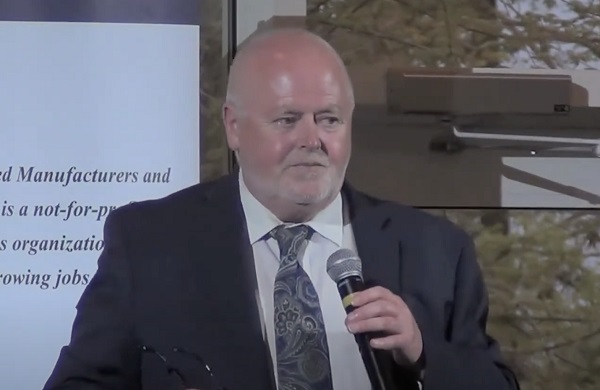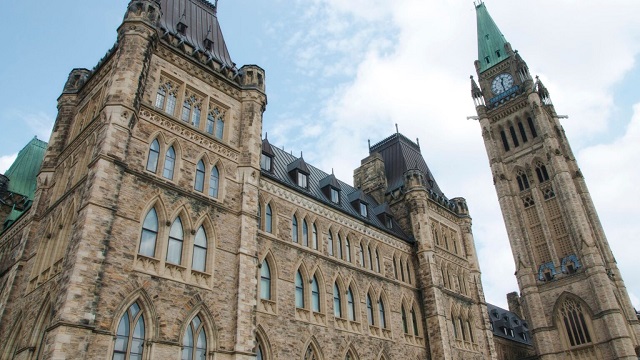Business
Former Canadian broadcast regulator warns against Conservative-backed internet bill

Peter Menzies served as CRTC vice-chair after an extensive career in the newspaper industry
From LifeSiteNews
‘By all means, ensure the Criminal Code is enforced, but do not, under any circumstances, put some puffed-up public servant in charge of patrolling the online world. The state has no business in the WiFi of the nation,’ former CRTC vice-chair Peter Menzies wrote.
One of the past vice-chairs of Canada’s official broadcast regulator, Canada’s Radio-Television Commission (CRTC), has sounded the alarm over recent Conservative-backed federal legislation working its way through the system which looks to severely regulate the internet under the appearance of “protecting children.”
Peter Menzies, who served as the CRTC’s vice-chair for a time after an extensive career in the newspaper industry, and who is not known for being very conservative, wrote in a recent blog post in The Hub that the “[s]tate has no business in the WiFi of the nation,” criticizing in particular Senate Bill S-210.
He specifically used his ink space to criticize the Conservative Party of Canada (CPC) and its leader Pierre Poilievre for supporting Bill S-210.
“The Conservatives, as we speak, are backers of Independent Senator Julie Miville-Dechene’s private member’s Bill S-210. Its intent, like so many pieces of legislation, is virtuous, as it is trying to protect children from access to online pornography. But the road to regulatory hell is paved with good intentions, and the legislation is so clumsily constructed as to pose significant threats to privacy and free expression,” wrote Menzies.
Currently before Canada’s House of Commons for review is Senate Bill S-210, “An Act to restrict young persons’ online access to sexually explicit material.” The bill passed its second reading in the House of Commons last December, with CPC MPs lambasting most Liberal Party MPs for voting against a bill designed to protect children from accessing online pornography.
The creator of the the non-governmental law, Miville-Dechêne, was appointed to the Senate by Prime Minister Justin Trudeau in 2018. It was passed by the Senate in April 2023.
S-210 would create a framework to make it an offense for any organization that makes available “sexually explicit material” to anyone under the age 18 for commercial purposes. Anyone breaking the new rules would be fined $250,000 for the first offense and up to $500,000 for any subsequent offenses.
However, professor Dr. Michael Geist, who has been an open critic of already passed Trudeau government online censorship bills C-18 and C-11, as well as the newly introduced “Online Harms” Bill C-63, has warned that S-210 is an “avalanche” of bad news despite its good intentions.
“Bill S-210 isn’t a slippery slope. It’s an avalanche: Court ordered site blocking that can include lawful content and mandated age verification using facial recognition to access search or social media overseen by CRTC. Conservative MPs voted for this?!” Geist posted recently on X.
Menzies observed that if the Conservatives genuinely “Want to give us back control of our lives and make us the freest people on earth, they could start by stepping back from their recent alliance with Big Government solutions and instead find ways to help individuals take control of their lives by managing what comes into their homes.”
He called S-210 “So clumsily constructed as to pose significant threats to privacy and free expression.”
Menzies warned that Bill S-210, despite its seemingly good intentions, could result in Canadians being forced to use government-issued IDs to access many different internet services.
Menzies wrote that in his view, it makes no sense that the CPC under Poilievre oppose Trudeau’s new Online Harms Act, or Bill C-63, yet support Bill S-210.
As for Bill C-63, it was introduced in the House of Commons on February 26 and was immediately blasted by constitutional experts as very troublesome.
The new law will further regulate the internet and will allow a new digital safety commission to conduct “secret commission hearings” against those found to have violated the new law, raising “serious concerns for the freedom of expression” of Canadians online, one constitutional lawyer warned LifeSiteNews.
The Liberals under Trudeau claim Bill C-63 will target certain cases of internet content removal, notably those involving child sexual abuse and pornography.
The reality is, that the federal government under Trudeau has gone all in on radical transgender ideology, including the so-called “transitioning” of minors, while at the same time introducing laws that on the surface, appear to be about helping children.
Under Trudeau, the federal government has given millions of taxpayer money to fund LGBT groups of various kinds and aggressively pushes a pro-LGBT agenda.
Trudeau gov’t needs to ‘leave legal internet’ content alone
Menzies observed that what needs to happen instead is for governments to “[l]eave legal content on the internet alone,” and instead empower “parents” to have more control over what can be viewed online.
“By all means, ensure the Criminal Code is enforced, but do not, under any circumstances, put some puffed-up public servant in charge of patrolling the online world. The state has no business in the WiFi of the nation,” he wrote.
“Second, empower parents and families with the equipment they need to control their household’s internet access as they see fit and work with the people who really understand technology to do so.”
The CPC under its leader Poilievre has clarified that Conservatives “do not support any measures that would allow the imposition of a digital ID or infringe on the privacy of adults and their freedom to access legal content online,” when it comes to Bill S-210 or another other future law.
Campaign Life Coalition recently warned that Bill C-63, or the Online Harms Act, will stifle free speech and crush pro-life activism.
Automotive
The EV ‘Bloodbath’ Arrives Early

 From the Daily Caller News Foundation
From the Daily Caller News Foundation
By David Blackmon
Ever since March 16, when presidential candidate Donald Trump created a controversy by predicting President Joe Biden’s efforts to force Americans to convert their lives to electric-vehicle (EV) lifestyles would end in a “bloodbath” for the U.S. auto industry, the industry’s own disastrous results have consistently proven him accurate.
The latest example came this week when Ford Motor Company reported that it had somehow managed to lose $132,000 per unit sold during Q1 2024 in its Model e EV division. The disastrous first quarter results follow the equally disastrous results for 2023, when the company said it lost $4.7 billion in Model e for the full 12-month period.
While the company has remained profitable overall thanks to strong demand for its legacy internal combustion SUV, pickup, and heavy vehicle models, the string of major losses in its EV line led the company to announce a shift in strategic vision in early April. Ford CEO Jim Farley said then that the company would delay the introduction of additional planned all-electric models and scale back production of current models like the F-150 Lightning pickup while refocusing efforts on introducing new hybrid models across its business line.
General Motors reported it had good overall Q1 results, but they were based on strong sales of its gas-powered SUV and truck models, not its EVs. GM is so gun-shy about reporting EV-specific results that it doesn’t break them out in its quarterly reports, so there is no way of knowing what the real bottom line amounts to from that part of the business. This is possibly a practice Ford should consider adopting.
After reporting its own disappointing Q1 results in which adjusted earnings collapsed by 48% and deliveries dropped by 20% from the previous quarter, Tesla announced it is laying off 10 percent of its global workforce, including 2,688 employees at its Austin plant, where its vaunted Cybertruck is manufactured. Since its introduction in November, the Cybertruck has been beset by buyer complaints ranging from breakdowns within minutes after taking delivery, to its $3,000 camping tent feature failing to deploy, to an incident in which one buyer complained his vehicle shut down for 5 hours after he failed to put the truck in “carwash mode” before running it through a local car wash.
Meanwhile, international auto rental company Hertz is now fire selling its own fleet of Teslas and other EV models in its efforts to salvage a little final value from what is turning out to be a disastrous EV gamble. In a giant fit of green virtue-signaling, the company invested whole hog into the Biden subsidy program in 2021 with a mass purchase of as many as 100,000 Teslas and 50,000 Polestar models, only to find that customer demand for renting electric cars was as tepid as demand to buy them outright. For its troubles, Hertz reported it had lost $392 million during Q1, attributing $195 million of the loss to its EV struggles. Hertz’s share price plummeted by about 20% on April 25, and was down by 55% for the year.
If all this financial carnage does not yet constitute a “bloodbath” for the U.S. EV sector, it is difficult to imagine what would. But wait: It really isn’t all that hard to imagine at all, is it? When he used that term back in March, Trump was referring not just to the ruinous Biden subsidy program, but also to plans by China to establish an EV-manufacturing beachhead in Mexico, from which it would be able to flood the U.S. market with its cheap but high-quality electric models. That would definitely cause an already disastrous domestic EV market to get even worse, wouldn’t it?
The bottom line here is that it is becoming obvious even to ardent EV fans that US consumer demand for EVs has reached a peak long before the industry and government expected it would.
It’s a bit of a perfect storm, one that rent-seeking company executives and obliging policymakers brought upon themselves. Given that this outcome was highly predictable, with so many warning that it was in fact inevitable, a reckoning from investors and corporate boards and voters will soon come due. It could become a bloodbath of its own, and perhaps it should.
David Blackmon is an energy writer and consultant based in Texas. He spent 40 years in the oil and gas business, where he specialized in public policy and communications.
Business
Honda deal latest episode of corporate welfare in Ontario

From the Fraser Institute
By Jake Fuss and Tegan Hill
If Honda, Volkswagen and Stellantis are unwilling to build their EV battery plants in Ontario without corporate welfare, that sends a strong signal that those projects make little economic sense.
On Thursday, the Trudeau and Ford governments announced they will dole out an estimated $5 billion in corporate welfare to Honda so the auto giant can build an electric vehicle (EV) battery plant and manufacture EVs in Ontario. This is the third such deal in Ontario, following similar corporate welfare handouts to Volkswagen ($13.2 billion) and Stellantis ($15.0 billion). Like the previous two deals, the Honda deal comes at a significant cost to taxpayers and will almost certainly fail to create widespread economic benefits for Ontarians.
The Trudeau and Ford governments finalized the Honda deal after more than a year of negotiations, with both governments promising direct incentives and tax credits. Of course, this isn’t free money. Taxpayers in Ontario and the rest of Canada will pay for this corporate welfare through their taxes.
Unfortunately, corporate welfare is nothing new. Governments in Canada have a long history of picking their favoured firms or industries and using a wide range of subsidies and other incentives to benefit those firms or industries selected for preferential treatment.
According to a recent study, the federal government spent $84.6 billion (adjusted for inflation) on business subsidies from 2007 to 2019 (the last pre-COVID year). Over the same period, provincial and local governments spent another $302.9 billion on business subsidies for their favoured firms and industries. (Notably, the study excludes other forms of government support such as loan guarantees, direct investments and regulatory privileges, so the total cost of corporate welfare during this period is actually much higher.)
Of course, when announcing the Honda deal, the Trudeau and Ford governments attempted to sell this latest example of corporate welfare as a way to create jobs. In reality, however, there’s little to no empirical evidence that corporate welfare creates jobs (on net) or produces widespread economic benefits.
Instead, these governments are simply picking winners and losers, shifting jobs and investment away from other firms and industries and circumventing the preferences of consumers and investors. If Honda, Volkswagen and Stellantis are unwilling to build their EV battery plants in Ontario without corporate welfare, that sends a strong signal that those projects make little economic sense.
Unfortunately, the Trudeau and Ford governments believe they know better than investors and entrepreneurs, so they’re using taxpayer money to allocate scarce resources—including labour—to their favoured projects and industries. Again, corporate welfare actually hinders economic growth, which Ontario and Canada desperately need, and often fails to produce jobs that would not otherwise have been created, while also requiring financial support from taxpayers.
It’s only a matter of time before other automakers ask for similar handouts from Ontario and the federal government. Indeed, after Volkswagen secured billions in federal subsidies, Stellantis stopped construction of an EV battery plant in Windsor until it received similar subsidies from the Trudeau government. Call it copycat corporate welfare.
Government handouts to corporations do not pave the path to economic success in Canada. To help foster widespread prosperity, governments should help create an environment where all businesses can succeed, rather than picking winners and losers on the backs of taxpayers.
Authors:
-

 COVID-192 days ago
COVID-192 days agoJapanese study finds ‘significant increases’ in cancer deaths after third mRNA COVID doses
-

 Business1 day ago
Business1 day agoMaxime Bernier warns Canadians of Trudeau’s plan to implement WEF global tax regime
-

 Brownstone Institute1 day ago
Brownstone Institute1 day agoA Coup Without Firing a Shot
-

 COVID-191 day ago
COVID-191 day agoWHO Official Admits the Truth About Passports
-

 Bruce Dowbiggin1 day ago
Bruce Dowbiggin1 day agoCoyotes Ugly: The Sad Obsession Of Gary Bettman
-

 Energy1 day ago
Energy1 day agoAnti-LNG activists have decided that they now actually care for LNG investors after years of calling to divest
-

 Freedom Convoy1 day ago
Freedom Convoy1 day agoOttawa spent “excessive” $2.2 million fighting Emergencies Act challenge
-

 Brownstone Institute1 day ago
Brownstone Institute1 day agoIs the Overton Window Real, Imagined, or Constructed?




